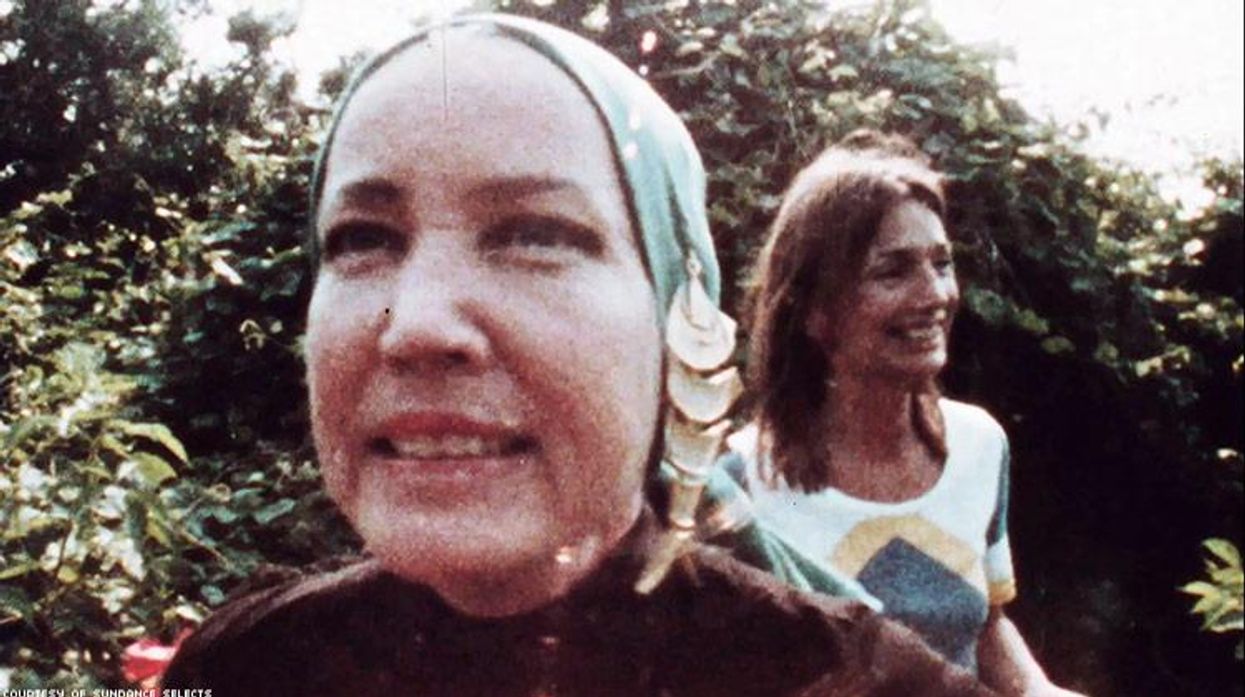For superfans of Little and Big Edie Beale, it seemed that the Grey Gardens well has finally run dry. Of course, there was Albert and David Maysles's iconic 1975 documentary about Jackie Kennedy's eccentric aunt and cousin, then the Tony-winning musical from the 2000s, the 2006 doc The Beales of Grey Gardens, and then Michael Sucsy's Emmy-winning 2009 HBO film about the women, simply titled Grey Gardens.
But there is indeed more: the new movie That Summer features never-before-seen footage of the Beales, filmed in the idyllic summer of 1972, partly by the Maysles brothers, and commissioned by artist Peter Beard and Jackie's sister, Lee Radziwill.
The movie, directed by Swedish filmmaker Goran Hugo Olsson, can accurately be described as a prequel to Grey Gardens. Radziwill, a socialite and none-too-successful actress, ventured to the Hamptons that summer of '72 -- with friends like Truman Capote, Andy Warhol, and Mick and Bianca Jagger in tow -- to not only relax but to make a movie about her childhood summers with Jackie. After seeing the footage, Radziwill decided to cancel the film and the footage was lost for decades, though the Maysles would return to Grey Gardens a few years later and, memorably, make their own film. The '72 footage was discovered in recent years and returned to Beard and Radziwill, who tasked Olsson with shaping it into a film.
In their original concept for the movie about Jackie and Lee's childhood, Radziwill and her friend Beard (it's not made explicit how close the very attractive pair were, as Radziwill was married at the time, but it was the '70s) knew they had to include the Beales. The aunt and cousin were already the subjects of intense media interest because of health officials' repeated visits to their crumbling, unsanitary house, Grey Gardens (typical headline of the day: "Jackie's Aunt Told: Clean Up Mansion").
Radziwill, 39 at the time, is the de facto protagonist of That Summer, and viewers see the Beales through her eyes. One might assume that the insanely wealthy Radziwill -- who lived a larger-than-life existence and now resides in Paris -- would be mortified by her shabby, down-on-their-luck relatives, but the opposite appears to be true.
"When I was coming of age, I was very into the art scene in New York," Olsson says. "It was like a dream world where people mingled from all walks of life and every background and class. And Lee was really a part of that. ... I know New York in the '70s was on the brink of bankruptcy, but it was tolerant. People were more accepting of other people."
That Summer shows Lee not only managing the clean-up and repair of Grey Gardens, but reminiscing with her aunt as Big Edie serenades her with that beautiful singing voice. As in Grey Gardens, Little Edie swans around her home and grounds, yanking at her clothes and mugging for the camera. She and Radziwill -- as different as can be -- also show a bond, with Little Edie petting Radziwill's hair as her cousin encourages her to throw away some of her unused belongings (Edie could also have been longing for the tresses that had already departed her head by 1972).
In a voice-over narration filmed a few years ago, Radziwill highlights her cousin's beauty and intelligence. In the film, Lee also interviews Hamptons locals about her and Jackie's hard-drinking, ladies' man father, John "Black Jack" Bouvier. For a relatively young woman, Radziwill has an endearing curiosity about her roots, and a need to memorialize the memories of her youth. This may be where Radziwill and her cousin diverge the most.
Dredging up the past "is cruel," Little Edie says to the camera in That Summer. For Little Edie, who was a strikingly beautiful debutante and had the world at her feet in the '30s, the past made a cruel mockery of her present.
"Most of us want to see progress in our lives, but you don't have to be ashamed that you have a romantic side," Olsson posits. "It's not a contradiction to me, looking back and romanticizing about, say, that summer when you were in love and close to your friends and everything was fine. We all have that desire."
Now, nearly 50 years after the Maysles first turned their cameras on the Beales, why do they still remain a public fascination?
"The Beales' situation is about being a woman and how eccentric are you allowed to be, how much of yourself are you allowed to be," Olsson says. "I think they are protected by their class and privilege to a certain extent and when they pass the limit of what's acceptable, the society and community hits back very hard. Also the music, singing, the dresses, I think it's something we fantasize about; roaring about this house amid empty bottles of champagne. It's a dream for many people who don't necessarily want it, but want to dream it."
That Summer is out now in New York and Los Angeles.





































































Charlie Kirk DID say stoning gay people was the 'perfect law' — and these other heinous quotes